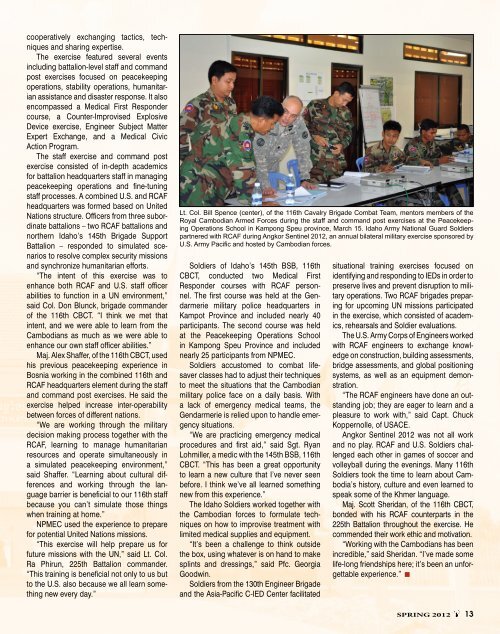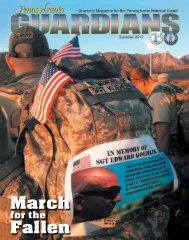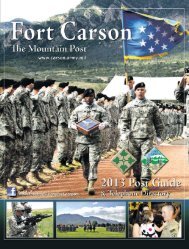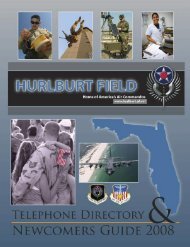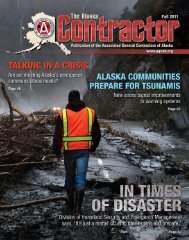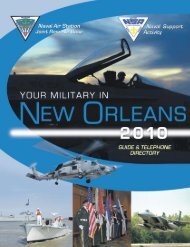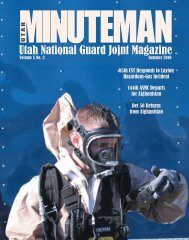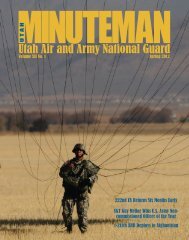The Gem State Guardian - Spring 2012
The Gem State Guardian - Spring 2012
The Gem State Guardian - Spring 2012
You also want an ePaper? Increase the reach of your titles
YUMPU automatically turns print PDFs into web optimized ePapers that Google loves.
cooperatively exchanging tactics, techniques<br />
and sharing expertise.<br />
<strong>The</strong> exercise featured several events<br />
including battalion-level staff and command<br />
post exercises focused on peacekeeping<br />
operations, stability operations, humanitarian<br />
assistance and disaster response. It also<br />
encompassed a Medical First Responder<br />
course, a Counter-Improvised Explosive<br />
Device exercise, Engineer Subject Matter<br />
Expert Exchange, and a Medical Civic<br />
Action Program.<br />
<strong>The</strong> staff exercise and command post<br />
exercise consisted of in-depth academics<br />
for battalion headquarters staff in managing<br />
peacekeeping operations and fi ne-tuning<br />
staff processes. A combined U.S. and RCAF<br />
headquarters was formed based on United<br />
Nations structure. Offi cers from three subordinate<br />
battalions – two RCAF battalions and<br />
northern Idaho’s 145th Brigade Support<br />
Battalion – responded to simulated scenarios<br />
to resolve complex security missions<br />
and synchronize humanitarian efforts.<br />
“<strong>The</strong> intent of this exercise was to<br />
enhance both RCAF and U.S. staff offi cer<br />
abilities to function in a UN environment,”<br />
said Col. Don Blunck, brigade commander<br />
of the 116th CBCT. “I think we met that<br />
intent, and we were able to learn from the<br />
Cambodians as much as we were able to<br />
enhance our own staff offi cer abilities.”<br />
Maj. Alex Shaffer, of the 116th CBCT, used<br />
his previous peacekeeping experience in<br />
Bosnia working in the combined 116th and<br />
RCAF headquarters element during the staff<br />
and command post exercises. He said the<br />
exercise helped increase inter-operability<br />
between forces of different nations.<br />
“We are working through the military<br />
decision making process together with the<br />
RCAF, learning to manage humanitarian<br />
resources and operate simultaneously in<br />
a simulated peacekeeping environment,”<br />
said Shaffer. “Learning about cultural differences<br />
and working through the language<br />
barrier is benefi cial to our 116th staff<br />
because you can’t simulate those things<br />
when training at home.”<br />
NPMEC used the experience to prepare<br />
for potential United Nations missions.<br />
“This exercise will help prepare us for<br />
future missions with the UN,” said Lt. Col.<br />
Ra Phirun, 225th Battalion commander.<br />
“This training is benefi cial not only to us but<br />
to the U.S. also because we all learn something<br />
new every day.”<br />
Lt. Col. Bill Spence (center), of the 116th Cavalry Brigade Combat Team, mentors members of the<br />
Royal Cambodian Armed Forces during the staff and command post exercises at the Peacekeeping<br />
Operations School in Kampong Speu province, March 15. Idaho Army National Guard Soldiers<br />
partnered with RCAF during Angkor Sentinel <strong>2012</strong>, an annual bilateral military exercise sponsored by<br />
U.S. Army Pacifi c and hosted by Cambodian forces.<br />
Soldiers of Idaho’s 145th BSB, 116th<br />
CBCT, conducted two Medical First<br />
Responder courses with RCAF personnel.<br />
<strong>The</strong> fi rst course was held at the Gendarmerie<br />
military police headquarters in<br />
Kampot Province and included nearly 40<br />
participants. <strong>The</strong> second course was held<br />
at the Peacekeeping Operations School<br />
in Kampong Speu Province and included<br />
nearly 25 participants from NPMEC.<br />
Soldiers accustomed to combat lifesaver<br />
classes had to adjust their techniques<br />
to meet the situations that the Cambodian<br />
military police face on a daily basis. With<br />
a lack of emergency medical teams, the<br />
Gendarmerie is relied upon to handle emergency<br />
situations.<br />
“We are practicing emergency medical<br />
procedures and fi rst aid,” said Sgt. Ryan<br />
Lohmiller, a medic with the 145th BSB, 116th<br />
CBCT. “This has been a great opportunity<br />
to learn a new culture that I’ve never seen<br />
before. I think we’ve all learned something<br />
new from this experience.”<br />
<strong>The</strong> Idaho Soldiers worked together with<br />
the Cambodian forces to formulate techniques<br />
on how to improvise treatment with<br />
limited medical supplies and equipment.<br />
“It’s been a challenge to think outside<br />
the box, using whatever is on hand to make<br />
splints and dressings,” said Pfc. Georgia<br />
Goodwin.<br />
Soldiers from the 130th Engineer Brigade<br />
and the Asia-Pacifi c C-IED Center facilitated<br />
situational training exercises focused on<br />
identifying and responding to IEDs in order to<br />
preserve lives and prevent disruption to military<br />
operations. Two RCAF brigades preparing<br />
for upcoming UN missions participated<br />
in the exercise, which consisted of academics,<br />
rehearsals and Soldier evaluations.<br />
<strong>The</strong> U.S. Army Corps of Engineers worked<br />
with RCAF engineers to exchange knowledge<br />
on construction, building assessments,<br />
bridge assessments, and global positioning<br />
systems, as well as an equipment demonstration.<br />
“<strong>The</strong> RCAF engineers have done an outstanding<br />
job; they are eager to learn and a<br />
pleasure to work with,” said Capt. Chuck<br />
Koppernolle, of USACE.<br />
Angkor Sentinel <strong>2012</strong> was not all work<br />
and no play. RCAF and U.S. Soldiers challenged<br />
each other in games of soccer and<br />
volleyball during the evenings. Many 116th<br />
Soldiers took the time to learn about Cambodia’s<br />
history, culture and even learned to<br />
speak some of the Khmer language.<br />
Maj. Scott Sheridan, of the 116th CBCT,<br />
bonded with his RCAF counterparts in the<br />
225th Battalion throughout the exercise. He<br />
commended their work ethic and motivation.<br />
“Working with the Cambodians has been<br />
incredible,” said Sheridan. “I’ve made some<br />
life-long friendships here; it’s been an unforgettable<br />
experience.”<br />
spring <strong>2012</strong> 13


